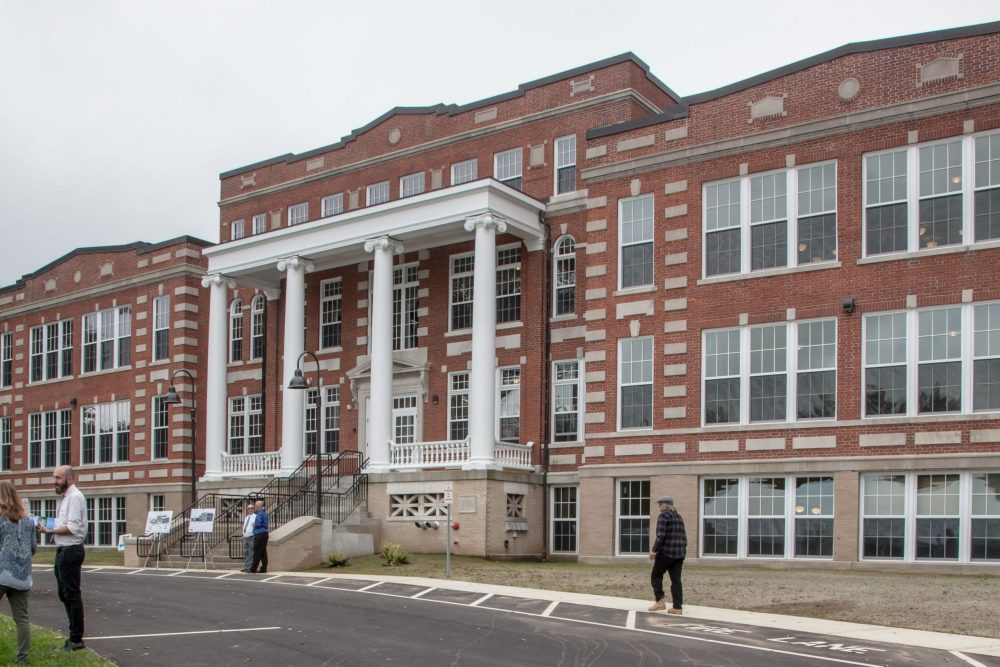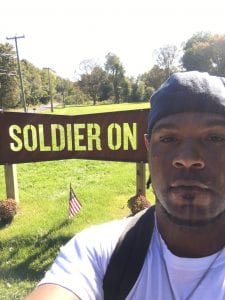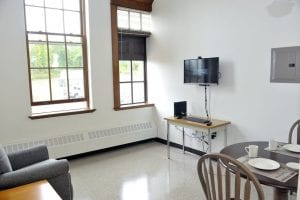
The palatial facade of the Gordon H. Mansfield Veterans Community in Agawam, Massachusetts. Photo courtesy of Anthony Wilson/Solider On

Veteran Anthony Wilson recently moved into his new home in the cooperative community. Photo courtesy of Anthony Wilson/Soldier On
Last fall, an unforgettable ceremony took place in Agawam, Massachusetts, when the first of 51 homeless veterans were handed keys to their new homes. For those vets, these were not just keys to their own apartment in a housing cooperative; these were keys to a new life as well. For the first time in a long time, the formerly homeless vets have a stable roof over their heads and a host of supportive services to give them independence throughout their new journey.
When Anthony Wilson, one of the incoming members, moved into his new home that first week, he told his case manager, “Walking into my unit brought tears to my eyes. This is my home, and no one can take that away from me.”
For Soldier On, a Northampton, Massachusetts-based veterans organization, the Gordon H. Mansfield Veterans Community in Agawam, Massachusetts, was a key chapter at the end of an almost 10-year struggle for this site to be a veterans community. When Soldier On set its eyes on the former home of the Western Massachusetts Regional Police Academy, it was love at first sight. The academy had classic architecture, with its white Greek columns highlighting the stately four-story building. Surrounding the buildings are seven acres of landscaped open space. With all that, it was sure to be an uplifting place for poverty-stricken homeless veterans to call home.
The former police academy was handed over to Soldier On by the State of Massachusetts for $1 in 2010. Massachusetts Lt. Gov. Timothy P. Murray said it was “a generational responsibility” to help the nation’s veterans. John F. Downing, president of Soldier On, joined Murray in saying there is an obligation to help “those who aren’t as gifted or able.” State Rep. Rosemary Sandlin, D-Agawam, who initiated the project and filed the Massachusetts state bill to allow for the sale of the property, characterized the project as “a hand up, not a handout.”
When I interviewed Bruce Buckley, CEO of Soldier On, he emphasized that, “every program begins with a human relationship and that through professional support and service, Soldier On would help build a sense of community, allowing the resident veterans to take ownership. We want a community where each of our vets is talking to other people every day, where the vets get a regular pat on the back or a warm handshake.”
Both Downing and Buckley believe that Soldier On’s co-op housing must make every veteran feel individually important. “Our veterans were in a military institutional structure where they were told what to do, and where a lot was done for them. After they left the military, those realities disappeared and that support evaporated,” says Downing.
“Vets returning to regular life have to create a new civilian identity. By providing beautiful, affordable housing, we are reaffirming to the vets that that is how important they are to us.”
Key Aspects of the Veteran’s Program
Life skills are also an important part of the Soldier On program, says Buckley. Vets participate in a 35-hour program that prepares them to live independently. “The program takes them through a range of exercises such as decision making, cooking for yourself, cooking for a friend, dietary tips, budgeting your money, weight loss, anger management, and coping with mental health issues. The program also provides day trips, games, and art to spur personal interests.”
Buckley is focused on moving the vets from dependency on institutional settings, such as homeless shelters, food pantries, and soup kitchens, to truly living independently and healthily in their own apartment.

Homes in the Agwam, Massachusetts, cooperative include many amenities, including a sitting room with an interactive television/computer. Photo courtesy of Anthony Wilson/Soldier On
So what are these homeless veterans moving into? There are 47 one-bedroom apartments of 475 sq. ft. each and four studios. But that is simplifying the situation. “Due to the nature of the majestic building, many of the apartments have very high, vaulted ceilings with large windows and plenty of light. Many of the apartments have beautiful spacious lofts, where you can look out and see the grandeur of your very own apartment. We wanted the vets to have the sense of their own beautiful apartment in a majestic building. The living space should emphasize to the vet that someone values them,” says Downing.
After years of homelessness, fighting isolation is a priority objective of Soldier On housing. Casey DiCicco, director of communications at Soldier On, says, “Each veteran at Agawam is assigned their own case manager. Soldier On also provides peer support, transportation to appointments in the community, and one meal a day. The vets can eat it in the dining room or take it to their apartment. In fact, a group of the vets at Agawam have organized themselves into a regular lunch group.”
DiCicco adds, “We encourage and support our residents to attend group activities—reading groups (book clubs), arts and cultural (performing arts and visit museums), recreational trips (fishing and camping), as well as attending professional sporting events. We also urge residents to volunteer in the community—for example, in late May, residents [partnered] with the Agawam Garden Club to weed and plant along Main Street in Agawam.”
In addition to regular check ups, Soldier On has invested heavily in technology to fill the isolation gap. Each apartment has been supplied with a 32” monitor that is both a TV and an interactive computer. The monitor is tied into a Soldier On service desk, where the resident veterans can get immediate help and support through Skype or text. Buckley adds that, “Soldier On has created a $2 million Call Center to serve its thousands of clients, including the Vets at Agawam”.
Although these dual-purpose units are expensive to put in, Soldier On feels they will be an important and immediate tool to deal with emergencies or medical alerts, yet will also help to build community and announce activities. Buckley said, “Each monitor will show a calendar for Agawam and other Soldier On sites, thus allowing the vet to make appointments online with a case worker or medical staff. The monitors are set up to encourage face-to-face meetings with Soldier On staff at any level. Isolation is a major source of depression for veterans and combating that in real time will be impactful and healthful.”
Residents can not only Skype with their case managers, but they can also attend groups that are going on at different campuses, in addition to being able to Skype with their families and other residents.
DiCicco shared a story of an elderly vet who had no idea what Skype was. Once he heard that through Skype he could see and speak to his grandchildren, who live far away, he asked the Agawam staff to teach him how to use the application. Now that vet relishes the regular Skype visits with his grandkids.
Some of the additional communal features of the co-op, says Buckley, include two patios with gas grills, a dining area for special and social events, a greenhouse, two laundry rooms, two onsite office rooms, a library and/or meeting room.
At Soldier On, says Buckley, “We make every effort to use our resources to maximize the number of apartments for veterans and make use of all the space available. The path to permanent, independent living from institutional living requires a conscious effort to form independent relationships. That’s why we promote socializing by choice in individual apartments as most of us do, with community events being promoted with people outside of the formerly homeless veteran community, and those in the community that fit one’s interests and lifestyle.”
Owning a Share in the Cooperative
Homeless Vets who meet HUD VASH (Veterans Affairs Supportive Housing) and low-income housing credit income thresholds are eligible to be co-op members. The monthly carrying charge, or rent, to live at Agawam is set at one-third of their income.
The organizational structure at the Gordon Mansfield Agawam Veterans’ Village is such that the property is owned for the first 15 years by Agawam Veterans Village LLC, which uses state and federal historic tax credits to obtain the equity financing. Gordon Mansfield Veterans’ Village Cooperative-Agawam is the limited-equity cooperative, the nonprofit partner in the project. After the charter board, the intent is for the co-op to have four to five members elected by the residents and one or two board members appointed to the board from the Agawam community.
Members of the co-op must obtain $2,500 to invest in one share. Since many of the homeless veterans are not able to raise the full $2,500, Soldier On has worked with several local banks and credit unions to create a pool of funds. Those dollars can be donated or loaned to prospective members for them to meet the full $2,500 share. At the end of each year, after paying off all obligations, if there is a surplus of funds, the co-op issues a rebate to each of its members.
The Gordon H. Mansfield Veterans’ Community in Agawam is a replication of the first limited-equity cooperative done by Soldier On. The initial Gordon H. Mansfield Veterans’ Community, named after a former deputy secretary of veteran’s affairs—a highly decorated Army veteran who survived two tours of duty in Vietnam—was opened in nearby Pittsfield, Massachusetts, in 2010. The Pittsfield cooperative provides housing for 39 veterans in a community of all newly built housing.
Downing conceived and spearheaded the program for limited-equity housing. Just before the dedication, Downing said, “Agawam is a community that many of our people would be comfortable living in. It offers a lot of supportive services.”
Many groups that house veterans are beginning to look at Solder On’s veteran’s cooperative housing program. However, housing cooperatives specifically for veterans are not new. Since 1945, housing co-ops for vets have helped returning servicemen and servicewoman rebuild their lives. In an amazing national effort, 46 veterans’ housing co-ops have been built in 15 states, providing 14,721 units of cooperative housing for 50,000 veterans and their families.





David:
Thank you for your continued service to veterans.
My name is Carl Hebinck, Korean veteran and retired builder of energy efficient homes throughout the country and mainly in Florida.
There’s a housing problem in the Tampa Bay area for homeless veterans and other veterans needing “affordable” housing. As a volunteer in Haiti after their terrible earthquake I helped construct Steel Structural Insulated Paneled houses for victims. I was very impressed with this building technology which is designed to withstand the worst forces of nature. See: the 8:47 min video on Youtube: THE FUTURE OF RESIDENTIAL HOUSING This video will give you an idea of the technology and ease of putting up safe beautiful houses.
My idea is to see if we can form a cooperative in the Tampa Bay area to provide jobs for veterans to manufacture the panels and build safe homes for their veteran brothers and sisters in our area.
My service in this endeavor will be entirely gratis.
Your article was an inspiration.
Could you provide some guidance.
Respectfully, Carl Hebinck, USAF ret.